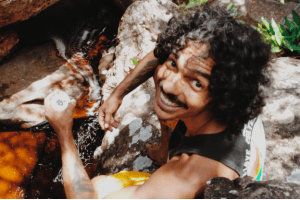Rafael (Rafa) Rebello is a Rio-borne, Black Brazilian climbing, trekking, and hiking guide for both children and adults in Brazil. In a 2021article, “Climbing is Not a Meritocracy”, he explains the difficulty of climbing as a minority in Brazil. After reading this article, I was curious to learn more about Rafa’s experience with intersectionality and the outdoors.

On a sunny Saturday afternoon, I hop on an incoming video call from Brazil. Wearing a red sweatshirt, with curly hair and a kind, quiet smile, Rafa Rebello greets me cheerfully. In the background: a large window looks out on a green and lush backyard. We start off our conversation about a great climb I’ve just seen on Rafa’s instagram story, and transition into a conversation about Rafa’s passion for giving and hearing talks about race, climbing, and the outdoors.
Rafa grew up exploring Rio’s woodlands. His mom, a single parent, who Rafa speaks of as one of his biggest inspirations in the work he does, brought him to scramble up a little rock slope, eventually leading to his love for climbing. Years later, his friend took him to a real climbing spot in Rio, where he did his first multi-pitch climb, sparking his joy for climbing competitively. Rafa has been climbing for 20 years now, having competed in the Rio State Championship, as well as a number of other high-level climbing competitions.
Right before the pandemic, Rafa and some of his friends started a non-profit called ‘Coletivo de Escalada de Lençóis’ for kids (of whom were mostly people of color) to get involved with climbing. Knowing that most of the representation for climbing in the area were white, cis and affluent men, the collective has had to work hard to ensure that these kids just get the opportunities to climb, with the right role models.
There are a fair number of organizations around the world who are putting in the good work to make the outdoors more inclusive– Brown Girls Climb, BraveTrails, and TranSending are some great examples from the United States and Europe– but Rafa’s is one of the first in Brazil.
Rafa describes how difficult it is to encourage kids in Brazil to get into climbing due to lack of representation and the financial burden of the sport. He explains: “The kids know that these climbers are mostly from other places. They ask me, ‘Rafa, most of the climbers here, they’re not from here right?’ They are aware of how much it costs, and without any help or money or any way of overcoming the barriers that they face, they probably will struggle to get into this sport. [For them], it’s probably easier for them to play soccer or basketball– any other sports that are already encouraged in the city.”
A basic set of outdoor climbing gear cost around $550. So, Rafa has had to get creative. His non-profit finds support from other non-profit organizations, including some from United States, to help fund equipment and gear. They collect old gear and even use their own, personal gear for these new climbers. Rafa has put years worth of his own savings to buying– all so that they have comfortable first times on the rocks.
With girls and women, Rafa explains, it can be especially difficult to get out to the rock. Besides a generally more ‘protective’ stance from parents, Rafa reflects that girls tend not to return to the rocks when their first time climbing is with a mixed gender group. However, when those trips are led by women, the experience is more successful. So, Rafa has been working to collaborate with more women-led climbing trips for beginners.
Rafa says that his efforts aren’t about convincing the children to get into competitive climbing, or even for them to come back consistently; “it’s just seeing these kids love it. Even if it’s just for a month or two- I don’t mind if they bump into the project, and then leave to do something else. Just to be able to provide that experience is the most valuable thing, even if it’s just once.”
It is moments like these that Rafa finds the most joy and inspiration, and is what makes starting a non-profit organization worth it for him. Rafa mentions humorously that he knows that people refer to him as ‘the guy that talks about racism in Brazil and climbing’. It isn’t necessarily meant as a compliment. But, he smiles, he is glad for his reputation. He knows how he is contributing to the world.
Throughout our interview, there are a number of moments in which Rafa’s commitment to social justice comes through. He excitedly talks about the books that introduced him to where race, gender, and the outdoors meet; along this vein, he also stresses how important fostering a positive relationship with the natural environment is, making sure that he teaches his kids to leave the earth as they find it.
Rafa’s care for getting people out into the outdoors is apparent, even over a shoddy video call. Even moreso: his care for groups that are specifically created to encourage minorities in climbing to participate in it.
We end on a note about what keeps Rafa hopeful for the future of the climbing world. ‘When we start to reach out as a collective, we see that the scene is way bigger than we thought it was. We start to connect the dots’.